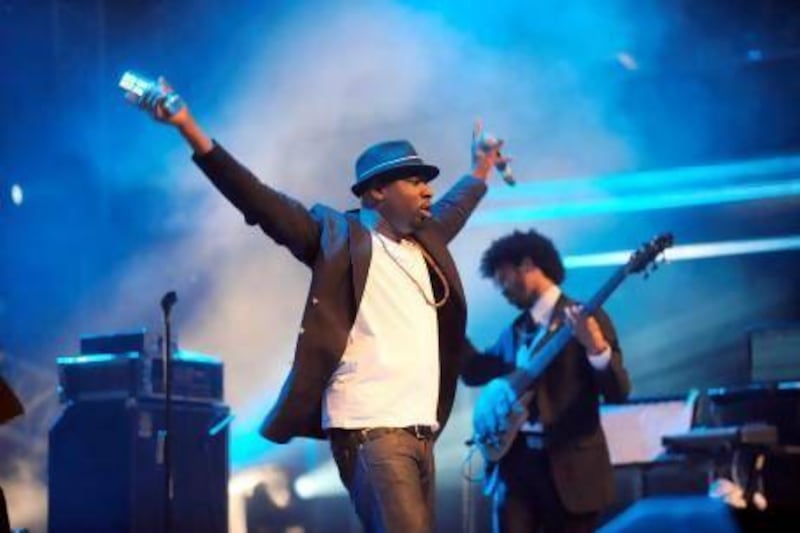Ever since it emerged in New York in the 1970s, hip-hop’s rhymes and beats have steadily chronicled the African-American experience.
When the genre became a mainstay of American pop-culture, some purists began looking abroad for the urgency and social outlook missing since the genre’s golden age.
Some of the freshest sounds at the moment are coming from the African continent.
From Ghana’s Lefa and the Congo’s Maître Gims – part of the French rap collective Sexion d’Assaut – to Morocco’s Don Bigg, African MCs are playing their part in reminding us that hip-hop has not disappeared in a sea of bling.
Straddling both western culture and African traditions is Blitz The Ambassador. Since 2000, the Ghanaian American rapper (real name Samuel Bazawule) has turned heads with his blend of African rhythms and old-school rap.
Where popular contemporaries wax lyrical about commercial gains, Bazawule’s two albums – 2008’s Stereotype and 2011’s Native Son – trace the journey of an African migrant bringing his art to the world.
The Ambassador moniker is no joke, Bazawule said at Morocco's Mawazine Festival, held earlier this year. In fact, he intends to be a spokesperson for his people.
“I find myself being that guy with an opinion about Africa. This is because I feel that in popular culture, not enough Africans speak for Africans,” says the musician.
“I know there are other things I could be talking about but I don’t want to miss this opportunity to be an African with the ability to talk on this subject. It’s important to me because there are very few of us who are in the spotlight.”
Bazawule’s latest single, Dikembe, illustrates his message.
Over a squalling guitar-laced beat, he dedicates energetic couplets to the underrated American basketball legend Dikembe Mutombo.
The 32-year-old says he first heard of the Congolese player in Ghana where he spent his childhood. “When I was a kid, we used to hear stories about how he built hospitals in the Congo,” he says. “It was great for us to hear a story about someone who made it and didn’t forget where he came from. He is a shining example of that.”
With his father a lawyer in the United Nations and his mother an educator, Bazawule recalls his childhood being driven by education and art.
A burgeoning painter as a child, Bazawule won a string of art competitions in Ghana before finding himself unwittingly led to hip-hop.
“I was sick of spending hours alone in the garage, painting and drawing,” he says.
“I needed music and hip-hop worked for me because it played on in the background while I worked. That’s exactly how I learnt a lot of lyrics from the 1990s.”
It was after his discovery of Public Enemy’s 1988 seminal release, It Takes A Nation of Millions to Hold Us Back, that Bazawule, then a teenager, decided to become a hip-hop artist. With his acclaimed guest verse on Deeba, produced by the Ghanaian producer Hammer of the Last Two, Bazawule was declared Best New Artist at the 2000 Ghana Music Awards.
His subsequent move to the US in 2000 – Ohio and eventually New York City – allowed Bazawule to finesse his live skills.
Like his heroes, however, Bazawule has not forgotten his heritage. His live performance at the Mawazine Festival was full of African flavours, from djembe drums to a horn section evoking the sounds of Ghana's Highlife and -Nigeria’s -Afro-beat.
A proud, independent artist, Bazawule says the indigenous elements are important to his crowd appeal. “The whole live band thing is down to marketing,” he says.
“The thing with that is, if you are going do it independently, then you are going to have to work twice as hard for half as much. I needed ways to differentiate myself so I added a horn section, which is now a staple of the live show. I can’t play without the horns; people don’t want to see me without the horns.”
The UAE could be next to witness Bazawule’s live experience, albeit in a limited format.
Talks are under way to bring Bazawule for a club show in Dubai later this year.
Bazawule hopes his anticipated third album, Afropolitan Dreams, will be out by then. He describes it as a continuation of his artistic -journey.
“The new album is about taking it from America to the world,” he says. “It’s about moving from immigrant status to cosmopolitan status. The album really captures all that but at the same time it remains strongly connected to Africa. “
Blitz The Ambassador recommends African hip-hop artists
Nnenka (Nigeria)
To me, she is very important. She is an amazing artist and a true storyteller.
Balogi (Congo)
He is a French rapper and I don’t understand a word he says but I can just feel it. He has this great ability to blend what it means to be African with living in the West. He knows how to connect the two.
Tumi and The Volume (South Africa)
He is an amazing performer and he needs to be seen live. Backed by The Volume, it is one of the best shows I have ever seen.
sasaeed@thenational.ae
Follow us
[ @LifeNationalUAE ]
Follow us on Facebook for discussions, entertainment, reviews, wellness and news.






